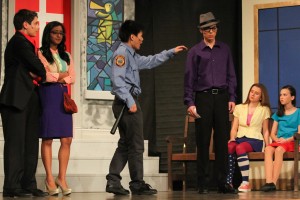OK, this has nothing to do with Grammar or the English language, but I have no other place to readily post this. Perhaps someone has a suggestion? I just saw a film that actually got me thinking about a number of things that I wanted to share. The review may not be all that well structured, but I hope it gets you thinking as well.
The main plot of Moonrise Kingdom is a coming of age story as the two main characters, 12-year-old Sam and Suzy, discover one another. Sam is an orphan, though no one seems aware of the fact; Suzy is a strong-willed pre-teen who already hates her family. We care for both kids because they have hearts on the verge of breaking or hardening, and like most young people of that age they feel they are outsiders (and in this case they probably are). Sam is a skilled “Khaki Scout” and picture painter; Suzy loves to read Young Adult fantasy novels with strong heroines. (Her books are all made-up titles, but they seem to be like the time travel stories of Madeleine L’Engle or the adventures of Mr. Bass on his planetoid.)
There is a brief campfire scene where Suzy is reading one of her novels to a group of Khaki Scouts. She is ready to put the book down and go to sleep, but the boys want to hear the rest of the story: Clear echoes of Wendy telling stories to the Lost Boys of Never Never Land.
That perhaps illustrates some of the tension of the age of the protagonists–in that impossible neverland between childhood and adolescence, part of them does not want to grow up, happy to stay in childhood, but part of them wants to grow up, to escape the limitations of childhood. In both cases we understand, if nothing else, they want to grow out of their present situations–the military styled scout camp where Sam is picked on by everyone or the gingerbread family home of Suzy whose efficiency-minded mother uses a megaphone to call the kids to supper from upstairs.
At the same time everyone is on an island. When Suzy’s mother breaks off a relationship with the island’s sole policeman, she says, “I’ll probably see you tomorrow”–not because she is still in love. It is simply that they are on an island–everyone sees everyone else almost daily.
The island is called New Penzance. Old Penzance is right before Land’s End, the last tip of southwestern England before sailing out into the ocean. So the kids are sailing off into the ocean of life. The island is shaped remarkably like Fishers Island, New York, though the surrounding mainland is quite different. We are told that the events take place right before a landscape-altering hurricane hits.
The hurricane becomes a factor in the film, but more like Captains Courageous than Nights in Rodanthe. The storm also has some symbolic value as standing for the storms of youth which contribute to most of the conflicts in the story. The church pageant near the beginning of the film (actually a flashback where Sam first sees Suzy) tells the story of Noah, a kind of foreshadowing of the flood to come. Suzy is a raven on the Ark. In the story from Genesis, the raven flies back and forth around the Ark, trying to leave but unable to do so until the waters have abated. So Suzy herself is trying to grow up and leave home, but is not going to be able to get too far unless she leaves the island.
Compared to the two Wes Anderson films that I have seen, this has more action. The story keeps moving, and there is a good balance between interior scenes which emphasize character and exterior scenes which have plenty of adventure. The interiors of Suzy’s family’s home are perfect renditions of New England beach houses (not cottages). Sam’s scout tent has stenciled figures on its walls to make us think of a tepee.
The conversations are somewhat stylized, more like stage acting, not unlike The Royal Tennenbaums, but they are effective. There is a sense of disjointedness throughout which highlights something of the human relationships in the film: the lonely policeman and scoutmaster, the parents who have difficulty carrying on a normal conversation with each other, and the social outcasts Sam and Suzy who are just looking for someone who understands them. The social worker on Sam’s case, as an orphan he is a ward of the state, has no name. She is a detached bureaucrat whom everyone calls Social Services.
But the film itself is set in 1965, a time in America when the culture itself was becoming disconnected or disjointed: the beginning of the sexual revolution, the so-called War on Poverty which institutionalized the breakup of families and the perpetuation of the underclass at the hands of bureaucrats, the escalation of the Vietnam War, and the rise of drug use.
While there is nothing in the film hinting at Vietnam or drug use (though Sam tries smoking a corncob pipe), the first two items do seep into the film. Though a few viewers might be offended or stimulated, the reference to sex in the film is awkward and as befits 12-year-olds in 1965 and is a minor part of Sam and Suzy’s attempts to find their places in the world. The orphaned Sam has drifted among foster homes as a pawn or a social services statistic. The disjointedness is highlighted by the discrete framed visuals in much of the film and the occasional use of split screens. The framed approach may also suggest Sam’s paintings and the covers of Suzy’s books.
There is some orchestral music from Benjamin Britten and Camille Saint-Saens. The church pageant about Noah is based on Britten’s Noye’s Fludde. Suzy’s brothers listen to Britten’s A Young Person’s Guide to the Orchestra, but we mostly hear about each instrument or group separately–we rarely hear the whole symphony together. That, too, adds to the theme of alienation, but it also suggests a possible finale: What would it be like when all the instruments play together?
There are also a number of Hank Williams songs. Country music was (still is) popular among the more rural areas in New England. A 1969 visit to my cousins in Eden, Vermont, turned me on to Merle Haggard. The songs are sometimes background songs but the AM radio in New Penzance seems to favor Mr. Williams. After about the third Williams tune, I started thinking of The Last Picture Show film, but other than the similar time period, I did not see much of a connection. Moonrise Kingdom is more hopeful than TLPS. “Kaw-liga” is played twice–both times when Sam is displaying Indian-like woodcraft. You hear a few bars of “Cold, Cold Heart” in the breakup scene.
When Same and Suzy are camping out in their semi-secret cove they call Moonrise Kingdom, Suzy shares her French Françoise Hardy record and they dance to it. (Suzy is a more skilled dancer, but she also knows the song by heart). Hardy was a popular go-go style singer in France at the time, but not as widely played in America. Even the appeal of that record to Suzy likely expresses her inability to find her place in her family, or even among the kids in the church pageant.
One flashback for me was the portable, battery-operated plastic record player. I had not seen one in decades. Suzy “borrows” this from her younger brother (who listens to Britten on it) when she runs away with Sam. In 1966, when I was a Boy Scout, I recall going on a camping trip or service project. One of the guys on the camping trip brought along a record player that was identical except for the color. He mostly played either popular dance tunes like “Hanky Panky” or folk songs like “Green Green.” Yeah, I said to myself as I was watching the film, that is what they did back then.
The acting and film shots are effective, if a bit quirky. The facial expressions, especially of Suzy and her father (played by Bill Murray), show why even though the staging is somewhat theatrical, the film medium catches detail impossible to pick up beyond the first few rows in a live theater.
There is a lot of conflict–internal psychological conflict inside Sam and others, complicated family and other interpersonal relationships, and conflict with Mother Nature once the storm moves in– but the film ultimately has a hopeful ending. You may not laugh a whole lot, though you will certainly laugh some, but you will smile. The missing ingredient in all these disjointed relationships, including the citizen-state relationship, is love. Sam and Suzy are not the only ones who discover love. And this is not a emotional or oversexed Hollywood substitute love, but one based on loyalty, honesty, and looking out for the real concerns of others.
Cast
Bruce Willis, Edward Norton, Bill Murray, Bob Balaban, Frances McDormand, Tilda Swinton, Jason Schwartzman, Jared Gilman (Sam), and Kara Hayward (Suzy).
Directed by Wes Anderson
Multiple Producers
Story Boards by Patrick Harpin

